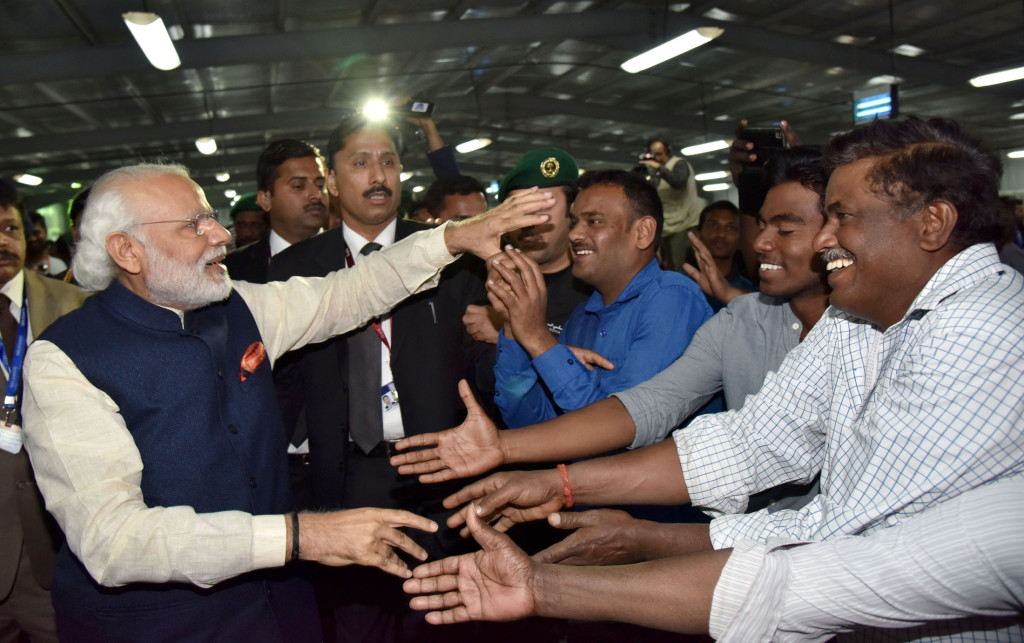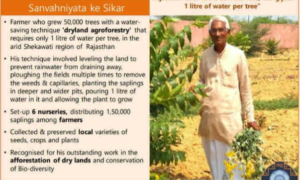Two years of Modi as PM, miles to go..

The Modi government has initiated many policy measures on all important frontiers of governance – be it economy, administration, foreign policy or security.

The Prime Minister Narendra Modi interacting with the workers at the L&T residential complex, in Riyadh Saudi Arabia on April 02, 2016.
As the NDA government headed by Prime Minister Narendra Modi sets to complete two years at the helm of affairs, the last stanza of British poet Robert Frost’s poem ‘Stopping by woods on a Snowy evening’ seems to have emerged as the guiding mantra for the government.
Robert Frost writes “The woods are lovely, dark and deep/ But I have promises to keep/ And miles to go before I sleep/ And miles to go before I sleep” and these lines essentially capture the state of the affairs for the incumbent at the Centre in the days to come.
The Modi government has initiated many policy measures on all important frontiers of governance – be it economy, administration, foreign policy or security.
The flagship schemes like Digital India are poised to transform the country into a digitally empowered society and knowledge economy.
Modi has already declared plans to create more public Wi-Fi spots including those at 500 railway stations across India and an aggressive expansion of the National Optical Fiber Network to take broadband to 600,000 villages – practically providing policy support to Mahatma Gandhi’s idea that India lives in her villages.
The restructuring of the Nirmal Bharat Abhiyan into Swachh Bharat Mission, National AYUSH Mission, Deendayal Upadhyaya Gram Jyoti Yojana, Prime Minister’s Crop Insurance Scheme, Prime Minister’s Skill Development Programme are a few among others that have emerged as the game changers for taking governance to the people.
The e-Kranti, which stands for the National e-governance Plan 2.0, intents to pragmatically implement the Prime Minister Modi’s dream of effective and efficient governance.
The sanitation aspect has always remained at the bottom of development agenda over the years despite strong endorsement by Mahatma Gandhi. Prime Minister Narendra Modi’s stress on sanitation can be called as one of the bold policy steps.
The Swachch Bharat Abhiyan found a special mention in British economist Lord Jim O’Neill’s report highlighting the importance of infection prevention and control in combating drug-resistant infections.
O’Neill, popularly known as the man who conceptualised the BRIC acronym for Brazil, Russia, India and China, stresses on the Indian government’s achievement through political commitment towards addressing the significant challenges of reducing the community spread of infections in today’s rapidly-growing emerging economies.
The drastic initiative on changing the structure of governance has been the creation of National Institution for Transforming India (NITI), which has already set an ambitious plan for effective governance like fixing the number of ministries at 15 percent of the total strength of the legislature and dove tailing the various centrally sponsored schemes.
These two measures among others set to bring in a revolutionary changes through pragmatic steps towards the Prime Minister’s ‘less government; more governance’ initiative.
The Atal Mission for Rejuvenation and Urban Transformation and Smart Cities Mission to drive economic growth and foster inclusive urban development and Shyama Prasad Mukherji Rurban Mission to drive economic, social and infrastructure development in rural areas respectively retain the keys for rapid transformations in two critical areas.
The government must now pro-actively attempt to usher in synergetic approach towards ensuring equity based development.
Apart from economic progress, the real development lies at ensuring the human development aspect. Social security schemes like the Atal Pension Yojna, Pradhan Mantri Jeevan Jyoti Bima Yojana and Pradhan Mantri Suraksha Bima will certainly shows the ‘human touch’ to the process of economic reforms under the Modi regime.
In the political economy of post Independent India, the country has been ensuring the inclusiveness aspect. The Modi government’s innovative Stand-up India initiative as a part of the Start-up India campaign aims to create 2.5 lakh SC and ST entrepreneurs.
This inclusiveness approach will help the Modi government craft its socially sensitive image.
At the milestones of two years, the Prime Minister shoulders a big responsibility of building a bridge between the politics and long term interest of the nation. These flagship schemes certainly retain the potential of transforming the politics and governance of India.

Sujit K Pruseth

Sachi Satapathy
(The authors are lead policy analysts)












































